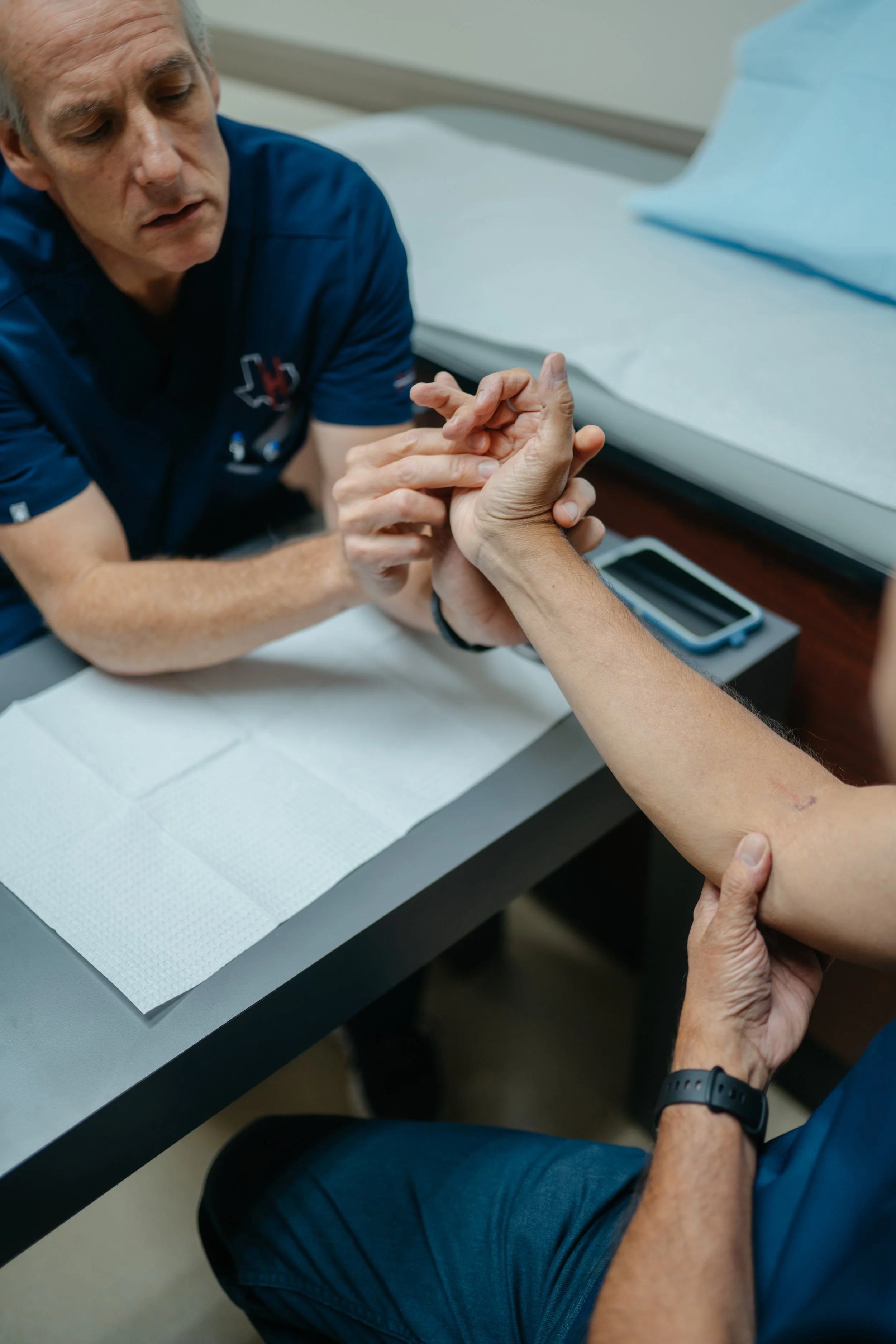How to Prevent Hand and Wrist Injuries at Work
our hands and wrists are your most valuable tools, essential for everything you do at work. From typing and lifting to operating machinery, they’re constantly in motion. Unfortunately, these same movements make hand and wrist injuries some of the most common workplace problems.
According to national data, more than 240,000 workers miss days of work each year because of hand injuries, and over 1 million are treated in emergency rooms annually. The encouraging news is that most of these injuries are preventable with the right habits, equipment, and awareness.
At the Hand & Upper Extremity Center of San Antonio, our mission goes beyond treating injuries. Our team of top hand surgeons in San Antonio helps patients understand how to protect their hands and wrists on the job, before an injury happens.
Common Workplace Hand and Wrist Injuries
Workplace injuries can develop suddenly or gradually, depending on the job. Some of the most frequent include:
Cuts and Lacerations: Often caused by sharp tools or materials. Even small cuts can damage tendons or nerves if not properly treated.
Carpal Tunnel Syndrome: Repetitive motion or prolonged wrist flexion can compress a key nerve, leading to pain, numbness, and weakness.
Repetitive Strain Injuries: Constant gripping, typing, or vibration can irritate muscles and tendons over time, reducing hand strength and mobility.
Trigger Finger: Inflammation of the tendon sheath makes fingers “catch” or lock when bent.
Fractures and Crush Injuries: Common in construction, manufacturing, and warehouse work, these can result from falls or machinery accidents.
Recognizing early warning signs, such as tingling, swelling, stiffness, or weakness, can prevent minor irritation from becoming a serious condition.
How to Prevent Hand and Wrist Injuries
1. Identify Hazards Early
Workplace safety starts with awareness. Take note of repetitive motions, vibration tools, or awkward positions that may cause strain. Employers should regularly inspect workstations and tools for potential hazards.
2. Wear Proper Protective Gear
Protective gloves are one of the simplest and most effective ways to prevent hand injuries. Yet 70% of hand injuries occur when workers aren’t wearing them, and 30% occur when they’re wearing the wrong type. Choose gloves designed for your specific tasks, whether you need cut resistance, grip, or thermal protection, and make sure they fit well.
3. Focus on Ergonomics
Whether you’re sitting at a computer or standing on a job site, proper ergonomics can make a major difference.
Keep wrists straight and aligned with your forearms.
Position keyboards, tools, and materials at a comfortable height.
Avoid resting wrists on hard edges.
Take short breaks every 30–60 minutes to stretch and move.
Ergonomic tools, cushioned grips, and adjustable workstations help prevent repetitive strain injuries and improve comfort.
4. Use Safe Technique
Good habits protect your hands. Avoid twisting or overextending your wrists while lifting or gripping objects. Use your larger arm muscles instead of relying on wrist strength alone. Relax your grip when possible, and change positions often to prevent fatigue.
5. Stretch and Strengthen
Taking a few minutes each day to stretch can improve flexibility and reduce tension. Simple wrist rotations, prayer stretches, and grip exercises with a soft ball can help maintain healthy joint movement and circulation.
When to See a Hand Doctor in San Antonio
If pain, numbness, or swelling in your hands or wrists doesn’t improve with rest, it’s time to see a specialist. Early evaluation can prevent long-term complications and help you return to work safely.
The Hand & Upper Extremity Center of San Antonio provides expert care for job-related injuries, including workers’ compensation doctors in San Antonio who specialize in diagnosing and treating occupational conditions. Our fellowship-trained surgeons and Certified Hand Therapists create personalized plans that help you recover quickly and safely.
Whether you’re dealing with carpal tunnel syndrome, tendonitis, or a work-related fracture, our team ensures your care is coordinated every step of the way.
Protect Your Hands and Your Career
If you’re starting to feel pain, stiffness, or tingling in your hands or wrists, don’t ignore it. Even minor discomfort can be a sign of overuse or injury that deserves professional attention.
Schedule an appointment with one of our specialists at the Hand & Upper Extremity Center of San Antonio for expert evaluation and care. Our team will identify the cause of your symptoms and develop a personalized treatment plan to help you recover safely and prevent future injuries.
Contact us today to learn more about our comprehensive hand and wrist services, state-of-the-art facilities, and how we can help you maintain strength, mobility, and confidence at work.




